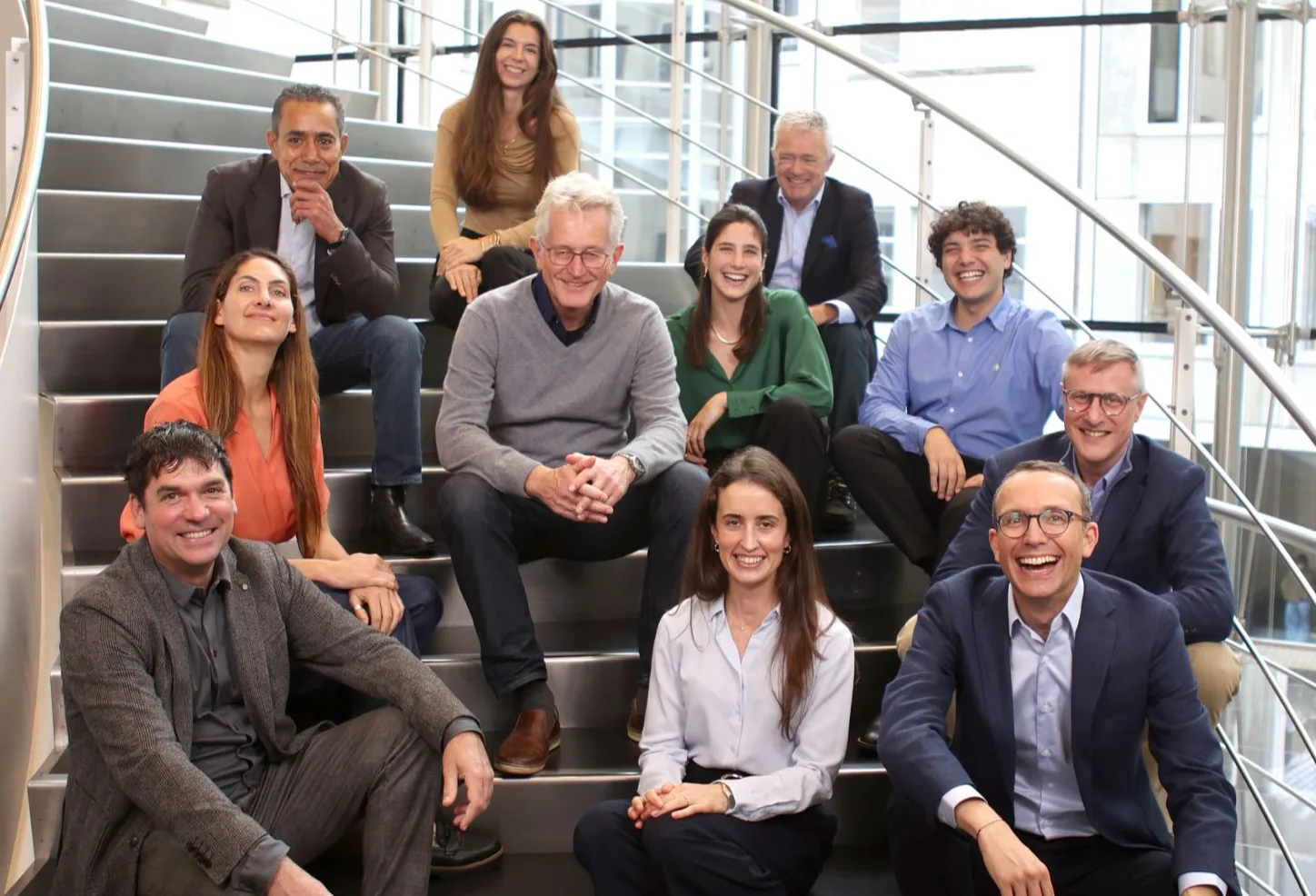Europe is now home to some of the world’s most highly valued generative AI startups, driving innovation well beyond Silicon Valley. From billion-dollar model developers like Mistral, Aleph Alpha, and Poolside, to application leaders such as Synthesia, Eleven Labs, and Lovable, these companies are shaping the next wave of AI adoption. Alongside them, infrastructure platforms like Hugging Face provide the tools and ecosystem that empower Europe’s generative AI movement.
Here’s a closer look at the most valuable players defining Europe’s GenAI landscape in 2025.
Learn more about the GenAI market in our latest report.
Mistral AI
- Total funding: €6.2 billion across 7 funding rounds with lead investors including Andreessen Horowitz, General Catalyst, Bpifrance, Headline, and NVIDIA
Mistral AI is a Paris-based startup building open-weight large language models. Its goal is to create cutting-edge generative AI (text, code, etc.) and provide Europe and global customers with an alternative to US/Chinese LLMs. From launch, Mistral’s models (e.g., a 7B-parameter “Mistral” model) have garnered attention for strong performance.
Co-founder Arthur Mensch emphasizes open-source principles (“open weights”) and high inference speed. The French government has actively promoted Mistral AI as a strategic homegrown AI asset. Strategically, Mistral helps diversify the AI landscape and may partner with cloud or device vendors to compete on cost/performance outside North America.
Recent updates
Mistral has been actively expanding its product lineup and partnerships. In February 2025, it launched Le Chat, a multilingual AI chatbot app available on web and mobile, with native iOS and Android versions. The app boasts ultra-fast inference, up to 1,000 words per second, positioning it as a Europe‑based alternative to ChatGPT.
Poolside AI
- Valuation: $5.8 billion
- Total funding: $626 million across 3 funding rounds with lead investors including Bpifrance, NVIDIA, StepStone Group, Inovia Capital, and Bain Capital Ventures
Poolside is building full-stack AI tools designed specifically to accelerate software development. The company develops a full-stack platform powered by its proprietary foundation models — Point, for real-time code completion, and Malibu, its flagship large model designed for advanced tasks such as code generation, debugging, testing, and refactoring. What sets Poolside apart is its Reinforcement Learning from Code Execution Feedback approach, which enables its models to generate, test, and iteratively improve code in synthetic environments. This allows them to "learn by coding themselves" and rapidly expand beyond the limitations of static training data.
In late 2024, Poolside deepened its partnership with Amazon Web Services, cutting training costs by up to 40% and making it easier for enterprises to securely fine-tune and deploy Poolside’s AI. The founders are outspoken about their belief that the path to artificial general intelligence runs through software.
Hugging Face
- Valuation: 4.5 billion
- Total funding: $395.2 million across 8 funding rounds with lead investors including Sequoia Capital, NVIDIA, Google, Amazon, and IBM
Hugging Face is a Franco-American open-source platform for machine learning, founded in 2016 and nowadays headquartered in New York. Known for its mission to “democratize good machine learning,” the company provides tools and infrastructure that enable developers to build, train, and deploy AI models, making it one of the most influential hubs for open-source AI worldwide.
Recent updates
In July 2025, Hugging Face expanded its presence in robotics with the launch of Reachy Mini, a compact, open-source robot designed for AI development, allowing users to program behaviors, test AI models, and engage in human-robot interaction research. The company is also working on HopeJr, a more advanced humanoid robot developed in collaboration with The Robot Studio.
Eleven Labs
- Valuation: $3.3 billion
- Total funding: $281 million across 5 funding rounds with lead investors including Andreessen Horowitz, Sequoia Capital, Valor Equity Partners, New Enterprise Associates and Endeavor Catalyst
Eleven Labs was founded in Poland, and though it is now registered in New York, it still retains its strong European roots. The startup specialises in highly realistic speech synthesis, voice cloning, and AI dubbing, aiming to make synthetic speech virtually indistinguishable from real human voices across languages, accents, and emotional tones. It has established itself as a global leader in voice AI, with rapid product offering expansion across recent years - from mobile voice apps to publishing platforms and enterprise-grade conversational agents.
Recent updates
In June 2024, ElevenLabs launched "Reader", a platform where users can upload any text or document and listen to it read in a human-quality voice, a clear play for the audiobook and education markets. The firm has also added podcast-generation (GenFM) and audiobook publishing features with integrated monetization for rights holders. ElevenLabs has also formed partnerships with publishers (e.g., The Washington Post, The Atlantic, MIT Technology Review) and gaming studios such as Paradox Interactive and Cloud Imperium Games. Strategically, ElevenLabs is well-positioned to own the synthetic voice and localization niche within the broader content ecosystem.
Beyond product and partnerships, ElevenLabs recently introduced a Startup Grants program, supporting early-stage startups in building voice-enabled products. To date, more than 4,000 grants have been awarded to startups like Allô, Layer, and OpusPro, with support from key investors and accelerators including ICONIQ, Andreessen Horowitz, Sequoia, Y Combinator, Entrepreneurs First, Antler, and Concept Ventures.
n8n
- Valuation: $2.3 billion
- Total funding: $79.3 million across 5 funding rounds with lead investors including Sequoia Capital, Automattic, Felicis, HV Capital, and Harpoon.
Berlin-based n8n builds a "Swiss Army Knife" for workflow automation, helping companies connect apps, data sources, and AI models to streamline their operations. Its platform blends no-code simplicity with developer-level flexibility, enabling enterprises to integrate AI agents and large language models into critical workflows — from IT and security operations to sales and finance automation.
Recent updates
After raising its Series B in March 2025, n8n is reportedly in talks for a Series C that could value the startup at $1.5B, with multiple VCs vying to lead the round. The company generated approximately $40 million in ARR last year and plans to expand its enterprise presence with new offices in New York and London. As AI-native automation demand accelerates, n8n is positioning itself as the go-to infrastructure layer for enterprises seeking to harness agentic AI at scale.
Synthesia
- Valuation: 2.1 billion
- Total funding: $336.6M across 7 funding rounds with lead investors including Accel, New Enterprise Associates, Kleiner Perkins, Seedcamp, and s16vc
Synthesia is one of the most prominent enterprise-facing generative AI video companies, showcasing how realistic synthetic videos can be adopted on a large scale by enterprises. The company has pioneered an AI-driven video creation platform that transforms text into realistic talking-head videos, powered by avatars and voice synthesis, allowing firms to create internal training, educational content, or marketing videos at scale without the need for live filming or actors.
Recent updates
By early 2025, Synthesia reported serving over 60,000 customers, including more than 60% of Fortune 100 companies, with clients spanning Reuters, Zoom, Microsoft, and Xerox. In the product lane, Synthesia introduced interactive video templates, personal avatar creation (via selfie uploads), real‑time teleprompter functionality, and deeper integration with learning management systems (LMS) for corporate training.
Lovable
- Valuation: 1.8 billion
- Total funding: $222.5 million across 3 funding rounds with lead investors including Antler, Accel, Creandum, Hummingbird Ventures, and QuantumLight
Stockholm-based Lovable is rewriting the way software is built. The startup’s "vibe coding" platform enables anyone, from non-technical founders to small businesses, to create fully functional websites, apps, and tools simply by chatting with AI. Founded in 2023 by Anton Osika and Fabian Hedin, Lovable achieved $100 million in annualized revenue in just eight months, making it the fastest-growing software startup in history, outpacing notable companies like Wiz and Deel.
Recent updates
The fresh $200 million Series A, which values the 45-person startup at $1.8 billion, will be used to expand its team and enhance the platform, particularly to support more complex app builds. Its rapid rise has drawn comparisons to Silicon Valley’s most disruptive players, although competition is intensifying from rivals like Replit, StackBlitz, and even Google.
Aleph Alpha
- Valuation: undisclosed
- Total funding: $533.6 million across 6 funding rounds with Deutsche Bank, 468 Capital, Lakestar, Hewlett Packard Enterprise, and SAP as lead investors
Based in Heidelberg, Aleph Alpha develops AI tools that enable companies and governments to tailor language models to their specific needs — whether it’s a multilingual internal chatbot or a model trained on highly technical, domain-specific data. Instead of competing head-on with OpenAI or France’s Mistral, the German startup is positioning itself as the AI infrastructure partner for enterprises that want efficiency and data sovereignty.
Recent updates
After raising a record $500 million in 2023, Aleph Alpha pivoted away from training its own LLMs to launch a "generative AI operating system" called Pharia. In early 2025, it introduced its tokenizer-free (T-Free) architecture, developed in partnership with AMD and Schwarz Digits, which removes a key barrier in fine-tuning models for new languages or specialized industries. The system can cut compute costs by up to 70% compared to token-based models like Meta’s Llama, while enabling faster and more accurate customization.







